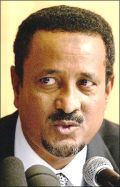Sudan proclaims major security improvements in Darfur
NAIROBI, May 18, 2005 (PANA) — Sudan’s humanitarian affairs minister
Ibrahim Mohamoud Hamid said here Wednesday that the security
situation and humanitarian access in the restive region of Darfur
has drastically improved despite the United Nations branding it
as the world’s most serious current humanitarian crisis.
 “The security situation is better…and it’s not our own
“The security situation is better…and it’s not our own
evaluation, it’s also the evaluation of the UN and the
international community.
“The movements of humanitarian assistance to the people are now
better and we have moved in the areas of tribal reconciliation to
ease tension among the different tribes,” the minister said.
“Most of the attacks on humanitarian workers are from the rebels
and it was once stated during our joint meeting with the UN that
rebels are responsible for the attacks. This is why the tribal
leaders asked the rebels not to attack, not only the convoys but
all the movements,” Hamid told reporters in Nairobi Wednesday.
He said the government has stepped up measures to maintain
security for the citizens, disarm the outlaws, ensure flow of
humanitarian aid and was currently working for realising
comprehensive political solution to the Darfur problems with the
participation of all parties.
“We have agreed to stop fighting in Darfur and come to the
political negotiations. We do not think the relief efforts are
that serious, the rebels are under pressure to stop attacks on
humanitarian convoys,” Hamid reiterated during an interview
conducted at the Sudanese embassy in Nairobi.
He said all parties engaged in the two-year old fighting have
committed themselves to cease-fire and reconciliation efforts
were underway to bring them to the negotiating table.
Sudanese authorities have been accused of impending relief work
in Darfur, and limiting the free movement of relief workers by
introducing restrictive visas for foreigners.
But authorities now say the government has set up a post-conflict
policy to ease humanitarian work in the troubled region to ensure
unhindered relief flow to more than one million displace people
in Darfur region, western Sudan.
“On political solutions, we have agreed that all political
parties go to Abuja for negotiations and we are waiting for the
Africa Union to fix the date for this meeting to take place,”
Hamid said.
He blamed recent attacks on aid workers on rebels, saying that
efforts were underway by tribal leaders to exert pressure on them
to observe the cease-fire.
The minister said the humanitarian policy was part of Sudan’s
efforts to streamline humanitarian aid and a response to
complaints of delays and lack of full co-operation from the
government in Khartoum.
Hamid, who was in Nairobi to attend a two-day meeting with UN aid
agencies and ex-rebel leaders in the South, expressed optimism
that peace was now returning to Sudan and appealed to those who
are still fighting to lay down their weapons.
“There is a lot of pressure on the rebels not to attack the aid
workers and to commit themselves to the cease-fire. They are also
being pushed to go for peace now not fighting and those who are
still doing so will be left out,” he said.
Meanwhile, financing of humanitarian operations for Darfur is
better than the rest of the country, the minister said.
“It takes about 60 percent while the rest of the Sudan including
Southern Sudan is about 25 percent. We also have more than 70
international aid organisations which have more than 8,000 staff,
so we don’t think we have problems in resources or capacity to
deliver relief to Darfur,” Hamid assured.
